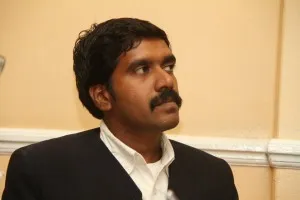Building GRC for small businesses - Shanmugavel Sankaran, FixNix

Meet Shan, the Chief Nixer at FixNix, who has been dreaming about entrepreneurship since the day he completed his higher secondary education. “Always wanted to pursue an education (plastic moulding technology, hotel management & catering technology) which will let me stand on my own. But the education (BE-Information Technology) that I pursued to satisfy my social circle, family, ruined me in a ‘good’ way, increasing my career prospects. Adding salt to the wound, the follow-up post-grad education (M.Tech.-Computer Sci Engg) took me to the best places, put me in the best comfort zone, not letting me come out of the same. Spent 10 years in IIIT-Hyderabad, Microsoft & IBM,” reads his bio.Now, at FixNix InfoSec Solutions Pvt Ltd, Shanmugavel Sankaran (Shan) is building a GRC (governance, risk management, and compliance) product for small and medium business (SMB). For starters, Wikipedia traces that widespread interest in GRC was sparked by the US Sarbanes-Oxley (SOX) Act and the need for the US-listed companies to design and implement suitable governance controls for SOX compliance; and that the focus of GRC has since shifted towards adding business value through improving operational decision-making and strategic planning.
“GRC is a space which is dominated by big boys like IBM; what I am trying to do is to make GRC available for SMBs, since they also have a need for protecting the data and governing their enterprise as per regulatory aspects,” says Shan. GRC market has penetrated well in major companies in mature markets, but there is a lot of scope in the emerging markets like Africa, he adds.
In a mail with subject line, ‘asante kushukuru’ (meaning, you are welcome, in Swahili), Shan recounts his views after the visit to Africa, in September, as part of the Nasscom delegation. “Kenya saw a terrorist attack while we were wrapping up our delegation. We were in the vicinity, on the day of the attack. The places I visited - Kenya, Uganda - seem to be very much like India in nature. Travelled by bike rickshaws, share autos, stayed in budget hotels, met the high-jump dancing tribes, flew with their local low-cost airlines, ate their local food…” he recounts.
On the question why Indian entrepreneurs should 'look beyond' and consider Africa, Shan says that the challenges there are often the same as what we’d love to solve here. “Hundreds of banks, African adoption towards new mobile payment technology innovation like M-Pesa at grass root levels, Hamara Bajaj success story in Africa – these prove that they're the one an entrepreneur may love to meet, and do business with.”







